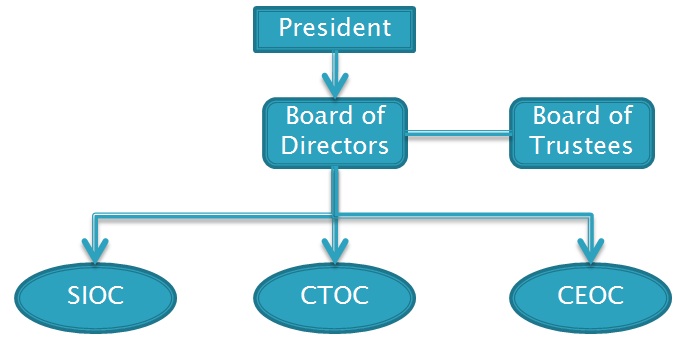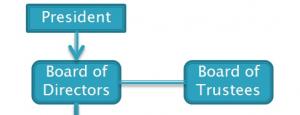In the spirit of the new school year, I thought I'd educate some young professionals and students about how AIChE works. The hope is that you'll discover which areas of AIChE seem most interesting to you, either personally or professionally. I've been around a bit as a volunteer of AIChE and I can tell you from experience that it can be very intimidating, just due to its immense scope and size. The institute covers all sorts of industries as well as all sorts of different internal activities.

However once one figures out the structure and how the different parts interact (and sometimes don't interact) with each other, I've found it very easy to navigate. So let's get to it shall we? GENERAL STRUCTURE
The Boards and President
The institute is essentially run by AIChE's board of directors and by its president. Well, to be honest, the AIChE president doesn't have much authority since the president's term is usually only one year. Typically, the AIChE president will try to enact programs or plans to help improve the institute as a whole, whether that be in the areas of increasing membership or having AIChE focus on technical initiatives like the Energy Initiative enacted by Dale Keairns.

It's the board of directors who really runs the show for AIChE. They are a 12-member group that decides how the institute's funds are spent and approves which programs run by which committees. There is also the board of trustees that operates somewhat independently of the board of directors and president. The purpose of the board of trustees is to seek out corporate donations and government grants that can assist in supporting programs that will enrich the membership of AIChE. A few programs that have benefited from the board of trustees efforts are the Scale-Up Program, which made national membership for students free, and the Opening Doors program, which supports the Young Professional House Parties as well as the Lunch and Learn Webinars. You will find that most of the people who are a part of these boards are high-level and well-connected engineers. This is where you'll find company presidents or well-known researchers or professors who may have written college textbooks at one time or another. This is a good group to get in with but, with the exception of the board of trustees, you must be elected to these positions.
The Operating Councils
Though the board of directors has the ultimate authority over the programs run by the committees, it does not govern over every detail that makes up AIChE. Considering there are 100+ local sections, 110+ student chapters, approximately 20 divisions, and 30 committees that deal with all sorts of matters, the board would have a tough time trying to keep track of everything. Those groups are the responsibility of three operating councils. Each operating council oversees one specific area of the institute and they are responsible for the budget and programs run by the groups they oversee. Those operating councils, in turn, communicate with the board of directors on budgetary needs and progress on certain initiatives laid out by the board.
Career and Education Operating Council (CEOC)
The Career and Education Operating Council probably has the greatest influence over what happens to you and me as members of AIChE. All of the local sections and student chapters are

under the charge of this operating council, which means it represents most, if not all, members of AIChE. In addition there are other committees that are under CEOC.
- The Membership Committee handles general issues dealing with the health of AIChE in terms of the number of members. It's this committee's responsibility to come up with ways to help improve membership numbers and think of ways the institute can better serve its members.
- Professional Development (PD), Technician's Affairs (TA), and Education & Accreditation (E&A) handle the educational aspects of CEOC. The E&A and TA committees makes sure the college programs meet certain standards for the chemical engineering curriculum while the PD committee develops programs to help engineers gain and maintain their professional license.
- The Fellows represents long time members and contributors to AIChE. Membership of this group is much more exclusive. You must be nominated and endorsed by another fellow in order to join, however, the group is fairly active in participating in volunteer programs run by the other committees.
- The Local Section Committee and the Student Chapters Committee communicates to the sections and chapters the different programs or grants that are available for them to use. They are also charged with getting feedback on the state of the local sections, chapters, and individual groups.
- Finally, the Young Professional Board (YPAB) supports programs and local section groups that are aimed at creating relevant programs and events for young engineers and post-grads. This is where the magic happens.
You could almost consider CEOC and its committees like an everyday engineer group. Lots of the volunteers involved come from all walks of life and all areas of industry. The level of responsibility is much lighter than the boards and there isn't an official voting or nominating process, although CEOC and a few of the committees do have a few procedures in place for that. Obviously, there's a lot going on in this operating council and there is sure to be something that would be of interest to any member wanting to make a difference. This operating council is also good for young members who want to start out as an AIChE volunteer.
Chemical Engineering Technology Operating Council (CTOC)

This operating council is the meat and potatoes of the Institute. CTOC oversees the areas of research and new technologies associated with chemical engineering. In addition, they are responsible for all programming for the national meetings as well as for CEP. All technical divisions report to this operating council and it's those divisions who are counted on to provide content for the national meetings. This is where AIChE derives its technical relevance. Here are some of the committees that make up CTOC.
- National Programming Committee is in charge of putting together the content for all national meetings. As would be expected, this committee is one that has some of the greatest pull within CTOC as well as being the one with the largest structure (more 20 NPC groups working under them). This committee is run by an executive board who directs how the content is organized, through websites like Confex, as well as where the national meetings are held every year. This committee is serious business.
- There are about 20 technical divisions that oversee a whole variety of different areas of the chemical engineering industry and research. The biggest responsibility of these divisions is to organize and put together material for national meetings. Divisions function much in the same way as local sections and student chapters in that they have their own individual structure and procedures, which varies from division to division. There are some divisions with very rigid and formal structure like the Fuels & Petrochemical Division and others like the Process Development Division that is much more relaxed in the way it handles its business.
- The Publications Committee, as one would expect, oversees the quality of work in CEP. However, they are also responsible for looking at new ways to disseminate technical knowledge through other publications or types of media.
- Finally, there is the Research and New Technology Committee (RANTC). As its name suggests, RANTC's focus is on new technologies, research in chemical engineering, and AIChE's respective role.
If you want to meet the people who are the foremost experts on anything pertaining to chemical engineering this is where you'll find them. These experts comprise a diverse range of experience in all sorts of industries and areas of academia. Many of them may have contributed or written your college textbooks. Fortunately, these experts can be found according to which division has the most relevance in their field. The Chemical Engineering Technology Operating Council is also a good starting point for young engineers, however it can be tougher to navigate than CEOC. It is much more focused on providing content to national meetings and this may seem daunting if you're unsure of the value of your content. The good news is that the divisions have recognized this and have actively tried to make their groups more welcoming to younger members.
Societal Impact Operating Council (SIOC)
This is perhaps the operating council that has garnered the least amount of attention from the institute in the past few years but it probably has the greatest influence over the institute's

image to the general public. SIOC is responsible for volunteer programs that are run to help benefit society as a whole through the particular skills of chemical engineers. SIOC also deals with the social needs of chemical engineers in the areas of gender and minority equality. Here is the list of committees that SIOC governs:
- Government Relations Committee helps educate leaders in government on issues that impact chemical engineering. This committee has contributed material to government officials from information on energy policy to the impact of oil dispersants in the Gulf of Mexico after the BP oil spill.
- Minority Affairs Committee (MAC) looks at ways AIChE can support and assist disadvantaged minorities. They are also responsible for handing various awards and scholarships for qualifying and distinguished members.
- Women's Initiative Committee (WIC) is another active group that focuses on the role of female chemical engineers in industry as well as seeking ways AIChE can better serve them. This committee offers travel grants to student members who wish to attend the national meetings as well as scholarships. Membership in this committee isn't exclusive to women.
- International Committee is perhaps the newest and most interesting committee of AIChE. Recently AIChE has expanded internationally by opening an office in India as well as working with other chemical engineering societies such as IChemE. It appears this committee will gain greater importance and emphasis as the profession of chemical engineering becomes more globalized.
If there's a cause you want to champion or you have a strong desire to do some good in the world with your chemical engineering knowledge (or connections), this is the group to work with. SIOC is filled with passionate people who want to make a difference in the world and their intentions are quite noble. It is also filled with people who have government connections and engineers from the international community. This group is very invigorating and has attracted the attention of some young professionals in AIChE. I sure hope you've enjoyed this mini-tour of AIChE. Like I said it's a big organization but don't let that intimidate you. Its size allows for people with a great variety of backgrounds and interest to find their place and pursue their desires within the realm of chemical engineering. If any of you want to make a difference in our profession, AIChE is the perfect place to do it. By the way, if I left out certain groups or committees from my article, feel free to chime in and let us know about them and what they do for the institute. Finally, for those students reading this, I will be giving a talk at the Student National Conference in Salt Lake City about volunteering for AIChE. Please feel free to drop by and check it out.


Comments
Brian, this is a really thorough profile of AIChE as an organization. I think this will be really useful for all of our new members to see. Spread the word and share!
Brian, I had no idea how AIChE was structured! Thanks for sharing!
great synopsis
Good blog! Timely for the SLC conference (sorry I have been a bit behind on reading all the fabulous posts).
No problem May. Thanks for chiming in!
They are fabulous aren't they?